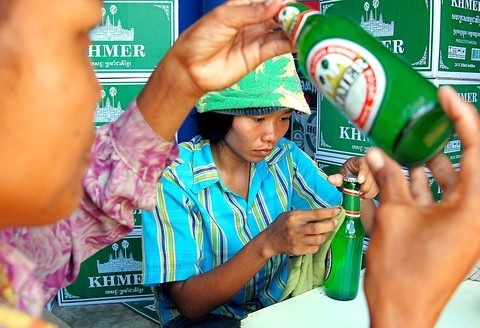In a hut built from the leaves of Cambodia's famed sugar-palm tree, a worker sloshes suds into used glass bottles, readying them to be filled with a unique local brew made from the bountiful tree: sugar palm beer.
The labels of international beer brands are scrubbed off bottles by some of the 20 staff here and replaced with stickers bearing the name "Khmer" featuring an image of Angkor Wat and two spiky sugar palms, Cambodia's national tree.
"We are nationalists who love the palm tree ... and this is a tree that can help reduce poverty," Pok Leakreasey says enthusiastically, referring to the 35 members of the local Club of Palm-Tree Lovers who set up the enterprise he directs.

PHOTO: AFP
The cider-like concoction, made from the tree's sap, has a sweet yet mouth-puckeringly tangy flavor. Distribution around the country is widening.
The brew is the brainchild of the club, whose members fear that the tree dotted across the emerald rice paddies of the kingdom, one of the world's poorest countries, is under threat.
Extra cash

PHOTO: AFP
With more than a third of Cambodians earning less than a dollar a day, the US$5 they are paid to sell the wood of a single sugar palm tree to businessmen is an easy way to earn extra cash. Though there are no official figures, reports say clusters of trees have been cut down in the provinces of Kandal, where Daun Mann is located, and neighboring Kampong Speu.
Traditionally, villagers used the sap tapped from the stems where the tree's fruit and flowers grow to make distinctively-flavored palm sugar, an essential addition to spicy curries and other Cambodian specialties. But increased competition from white cane sugar imported from neighboring Thailand, along with the spiralling cost of the firewood needed to help produce the palm sugar, means the trees have lost their luster.
So in 1999, the club successfully persuaded villagers at Daun Mann, a settlement about 30km west of Phnom Penh still studded with sugar palms, to use the sap to make vinegar. Then last year they hit on the tastier idea of using lightly fermented sour palm juice made from the sap, a popular elixir in rural Cambodia, into a carbonated "beer" with an alcohol content of 4.5 percent.
The result was a drink that Pok, 35, is confident has wide appeal.
"Consumer feedback is that the beverage is good and easy to drink," he says.
The factory churns out about 2,400 bottles per day, which are distributed to the capital Phnom Penh, Siem Reap -- the gateway town to the Angkor Wat temple complex -- and Battambang and Kampong Chhnang provinces.
Daun Mann villagers are paid 150 riel (four US cents) per liter of sap, selling up to 2,000 liters per day in total.
Uoch Vorn, 60, who has climbed the slender trees since he was 15, attaching bamboo containers to the stems to collect the sap overnight, is thrilled with the new market, which means he can earn about US$6 per day.
Selling sap
"Selling the sap is easier than making it into sugar. I can sell 150 liters a day doing this," he says, with the knife he uses to slash 25 trees twice a day tucked against his leg.
The drink was at first christened "Naga," but Pok says drinkers suggested the name "Khmer" -- the name of indigenous Cambodian people -- instead, believing they should capitalize on its roots.
"When people hear the words `tom yam' they know they are talking about Thai food," he says, referring to the spicy soup its neighbor is world-renowned for. "We wanted to do a similar thing, because palm trees represent Cambodia."
Kim Sea, who distributes the beer in Siem Reap, says he has already sold Khmer to more than 200 outlets, inclu-ding restaurants and supermarkets, and claims the new brand has been a hit among both tourists and Cambodians.
But he has received some complaints of upset stomachs from the beer, which sells at 1,500 riel (40 US cents) a bottle.
"Some consumers are concerned about the sanitation of the beer production and think it is not good enough," he says, adding that he has passed on the comments to the factory.
He is also encouraging tour guides to tell tourists about the drink, "but they dare not introduce it to them because they are afraid drinking it will cause them problems," he says, sighing.
It's a reflection perhaps of an ingrained wariness even among Cambodians themselves of products made in the kingdom, where there is virtually no industrial base. The beer has quality approval from the ministry of industry.
Pok, meanwhile, is aiming to double production next year when he expands advertising from local radio to national television. He aims to export Khmer, with companies from both Japan and the US taking samples back for study.
"But they have not ordered from us yet," he says, adding he remains hopeful of spreading the Khmer name worldwide.

On April 26, The Lancet published a letter from two doctors at Taichung-based China Medical University Hospital (CMUH) warning that “Taiwan’s Health Care System is on the Brink of Collapse.” The authors said that “Years of policy inaction and mismanagement of resources have led to the National Health Insurance system operating under unsustainable conditions.” The pushback was immediate. Errors in the paper were quickly identified and publicized, to discredit the authors (the hospital apologized). CNA reported that CMUH said the letter described Taiwan in 2021 as having 62 nurses per 10,000 people, when the correct number was 78 nurses per 10,000

As we live longer, our risk of cognitive impairment is increasing. How can we delay the onset of symptoms? Do we have to give up every indulgence or can small changes make a difference? We asked neurologists for tips on how to keep our brains healthy for life. TAKE CARE OF YOUR HEALTH “All of the sensible things that apply to bodily health apply to brain health,” says Suzanne O’Sullivan, a consultant in neurology at the National Hospital for Neurology and Neurosurgery in London, and the author of The Age of Diagnosis. “When you’re 20, you can get away with absolute

May 5 to May 11 What started out as friction between Taiwanese students at Taichung First High School and a Japanese head cook escalated dramatically over the first two weeks of May 1927. It began on April 30 when the cook’s wife knew that lotus starch used in that night’s dinner had rat feces in it, but failed to inform staff until the meal was already prepared. The students believed that her silence was intentional, and filed a complaint. The school’s Japanese administrators sided with the cook’s family, dismissing the students as troublemakers and clamping down on their freedoms — with

As Donald Trump’s executive order in March led to the shuttering of Voice of America (VOA) — the global broadcaster whose roots date back to the fight against Nazi propaganda — he quickly attracted support from figures not used to aligning themselves with any US administration. Trump had ordered the US Agency for Global Media, the federal agency that funds VOA and other groups promoting independent journalism overseas, to be “eliminated to the maximum extent consistent with applicable law.” The decision suddenly halted programming in 49 languages to more than 425 million people. In Moscow, Margarita Simonyan, the hardline editor-in-chief of the